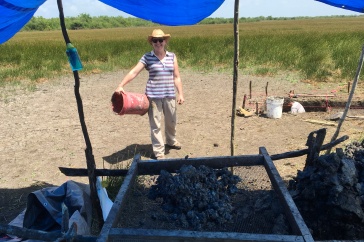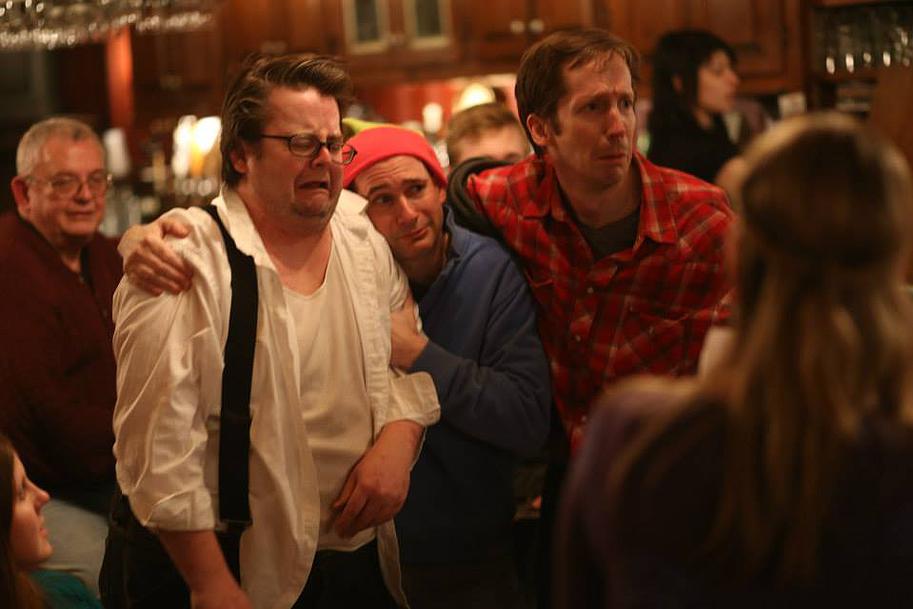
Banquo falls to the floor, stabbed. A gentleman raises his beer in reverence, and the rest of the bar follows suit. It’s a toast to the dead, and it’s not the first one of the evening. Just another Monday night in Portsmouth.
Banquo is the noble general in William Shakespeare’s "Macbeth" and one of several major characters who will die in this production of “The Scottish Play” being staged on the wide pine-planked second floor of The Press Room, a stalwart venue on Portsmouth’s entertainment scene and the setting for tonight’s tragedy.
This is ShakesBEERience, the interactive Shakespeare reading series and brainchild of a trio of UNH grads—Christine Penney ’99, Dan Beaulieu ’05 and Kevin Condardo ’05—who bring the bard to life year-round on Port City stages and beyond. Their Seven Stages Shakespeare Company is the only professional Shakespeare company in the Seacoast region.
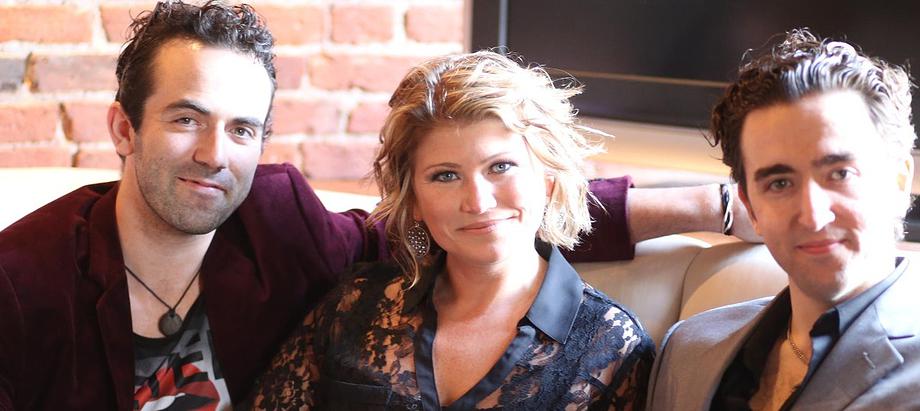
Upstairs at The Press Room is a long, narrow room with brick walls, a bar and tables and chairs. It’s warm and the lights cast a yellow glow. There is no stage. The actors, all professionals, comingle with the audience and the servers and bartenders who keep the food and beverages flowing throughout the performance.
Condardo says that in Shakespeare’s early years, “his audiences were rowdy.” It was common for the actors to interact with audience members, to sit down next to someone and ask, ‘Can you believe this is happening right now? Can you believe we’re seeing this?’ ShakesBEERience actors do the same.
The average age of tonight’s audience is about 30, thanks at least in part to the company’s free-for-all or pay-what-you-will philosophy, which attracts younger patrons who can’t afford a pricey ticket. The policy helps attract sponsors, too, says Beaulieu. “It gives us a sort of credibility to be able to walk into a meeting with a prospective sponsor and say, ‘Your sponsorship will give Johnny teenager an experience he won’t forget. And when he goes to college and has a Shakespeare course, he’ll be glad to take it.’”
ShakesBEERience takes a hiatus in the summer but the company does not. Shakespeare in Prescott Park, launched by Penney in 2011, a year before Seven Stages came to be, has become a summer ritual, with shows on Sunday afternoons in July and August through a partnership with the Prescott Park Arts Festival. Productions feature professional actors from New York, Boston, Portland and the greater Portsmouth area.
The trio has included UNH theatre department grads in almost every one of its productions because they speak the same vocabulary. “We were all trained the same way by the same people,” says Penney. Beaulieu agrees: “You can look at them and say, ‘We need you to go beyond the shoe.’” “And they’ll know what that means!” Condardo interjects.
UNH theatre professor David Kaye explains what it means to "go beyond the shoe”
But why Shakespeare, and why now?
“There was a gaping hole in Portsmouth,” says Beaulieu, a Hampton native. “So many great cities have resident Shakespeare or classic theatre companies; it seemed like something we could be doing here.” Beaulieu and Penney had been working together on Shakespearean productions since 2009, when she was directing "Julius Caesar" and he auditioned. “Dan and I spent a lot of time talking about Shakespeare,” says Penney. “One evening a few years after we met we were chilling at my place and thought, 'This work seems to be going very well. What if we actually made this a company?’” They launched it shortly thereafter.
Penney says advice she once received from a UNH theatre professor was foundational to the decision to launch. “David Richman told us, ‘Don’t wait for work to come to you. Create the work you want to do.’ That has stuck with me to this day and it has been the basis for everything artistic I’ve wanted to do,” says Penney. “We want to do Shakespeare? So let’s do Shakespeare; we’re not going to wait around for someone else to do it.”
Condardo, who by day is budget manager for the Brooklyn Academy of Music, joined Seven Stages in 2013 as the third leg of the stool. The company, whose mission is to illuminate the works of William Shakespeare through “artistically excellent and financially accessible productions and programs…” has produced "The Comedy of Errors," "Romeo and Juliet," "Much Ado About Nothing," "A Midsummer Night’s Dream," "The Merry Wives of Windsor," "King John," "Twelfth Night," "King Lear" and a host of other works. In 2013, they staged "Richard III" just after archaeologists discovered the bones of the king under a parking lot in England. (See “A Royal DNA Mystery, Five Centuries Later: UNH Professors Weigh In On Richard III Findings.”) The company also brings theatre education into schools.
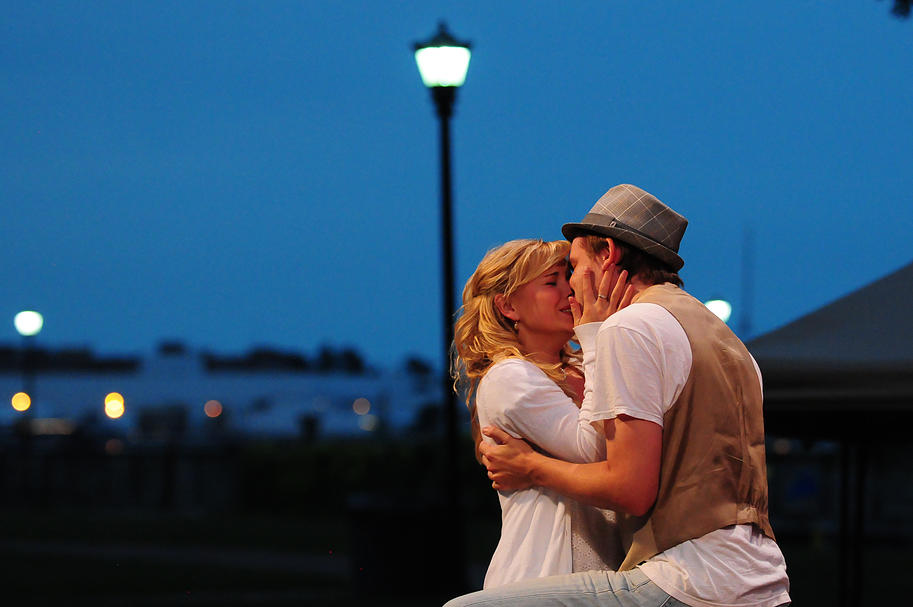
No Starving Artists
No, the work doesn’t pay the bills, at least not today. But that was never the impetus for starting the company.
“It’s amazing,” says Beaulieu, who works for the Fireman Hospitality Group in Manhattan during the week, returning to New Hampshire on weekends for his work as artistic director at Seven Stages. “To be able to have this sort of life is very much living the dream.”
Social Animals
“Please take your devices out and make sure they are turned ON” are words you typically don’t hear before a show begins, but before every Seven Stages production, the founders encourage the audience to snap, post and Tweet their way through the experience.
“You see all the teenagers literally perk up when we announce it,” says Seven Stages managing director Kevin Condardo.
For a 2013 production of “Romeo and Juliet” at Prescott Park in Portsmouth, they even created a Verona News syndicate that tweeted out reports of the events happening onstage, and the characters Tweeted throughout the show (“#party at the capulets,” “@ladyCAPs Mama Cap is not pleased”). Audience members could watch the actors tweeting in character—like when a gigantic ship wound its way up the Piscataqua River right next to the park and Sampsonia Capulet, as @BGirlSampsonia, tweeted “Psssshhhhhhh. Upstaging fiend.”
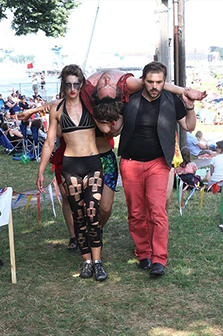
(Photo: Bushor Photography
“We made it ‘right now,’” says Seven Stages artistic director Dan Beaulieu. Which is exactly what William Shakespeare was doing in his day—taking poems and stories that existed hundereds of years yearlier and adapting them for Elizabethan England. “For contemporary audiences in the age of the device—the ‘me’ generation—it’s all about ‘How do I experience this? How do I feel this? How do I become a part of it?” says Beaulieu. “People want to be part of the equation. Then there was this whole period where theatre became a thing at a distance—the so-called proscenium wall—you observed from afar. But now we’re coming back to where it was in Shakespearean times.”
Condardo describes the group’s embrace of social media more pragmatically. “It’s not going to change, so we’re trying to lean into it,” he says. “If the audience is going to have their heads down texting, we have two options: We can be talking to them on their device, or we can, at ShakesBEERience, walk over to them, knock on their table and say ‘Hey, I’m right here.’ We’re in a unique place. When they’re not paying attention, we can bring them back.”
The company found a clever way of making sure devices were stowed for one of the most important scenes in “Romeo and Juliet,” however. “We set the balcony scene during a rainstorm, so we had water guns going,” explains Beaulieu. “They put their phones away so they wouldn’t get wet. It was out way of saying, ‘For the next five minutes, just watch the play.’”
The trio believes the good health of humanity depends upon artists and the arts. So this summer, when citizens of Portsmouth found themselves locked in debate over noise and how much is too much when it comes to live performances, and when one letter-to-the-editor writer suggested that art belonged in a gallery behind closed doors, they responded in the way they knew best, staging a hushed production of Shakespeare's "Coriolanus" under the street lights of Market Square on a misty Sunday evening.
“'Coriolanus' is all about the importance of leadership listening, the idea of the people having a voice,” says Penney. “That was at the heart of what was going on, so we decided to shine a light on it.” So they did, literally, shine their flashlights on the scripts that night, with actors whispering the lines. It was hard to hear them, and that was the point. Seven Stages posted and Tweeted the script so the audience could follow along.
Shakespeare Everywhere
What’s next for Seven Stages? More Shakespeare. ShakesBEERience made its west-coast debut in 2013 and is now staged quarterly in San Jose. Soon the company will announce a spring 2015 production and reveal its pick for the summer show at Prescott Park. Two other full-scale productions are in the planning stages.
But how much longer can an old bard stay relevant in the snippets and soundbites culture we live in? As long as the bones of Richard III, they say. “There’s a movement happening right now with Shakespeare,” says Beaulieu. “Modern culture is heading very much toward the instant, the immediate, but there’s a whole subculture that’s saying ‘Let’s take a look at the past. How do we take that past and ask what’s important that we may be losing or forgetting, and how do we bring that past into the present and start to create whatever the future looks like?’ I see it happening with Shakespeare all over the world.”
Outtakes
There was a point in time, in the days before “follow your heart” became acceptable advice for high-schoolers, that many parents and even some guidance counselors discouraged all but the most obviously gifted college-bound seniors from majoring in theatre, deeming it “impractical.” Luckily, that was not the case for the founders of Seven Stages. We asked each of them what brought them to the UNH theatre department.

Christine Penney:
I was a communications major all the way through junior year, then I took Acting I and felt something “waking up.” I sat down with my parents and said, ‘I think I want to declare a second major and I know it’s really late, but I think I really want to do it.’ So I stayed a fifth year and did the whole theatre major in one year, which was such a gift because it made me feel as if I was in a conservatory. It was incredible—the highlight of my UNH experience.”
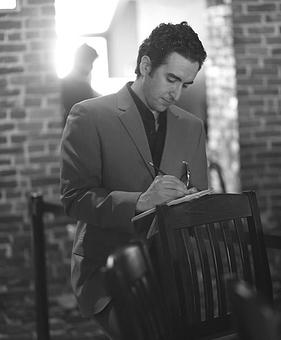
Kevin Condardo:
Kevin Condardo says he “lucked out like crazy walking into the amazing UNH theatre department that really forces you to learn everything.” He recalls a story one of his graduate school classmates told about her graduation from NYU. “She was a theatre major, but graduation was her first time on NYU’s gigantic main stage, and she and the other actors couldn’t find their light because they’d never been on a big stage before then. I remember thinking, ‘Not only do I know how to find that light, I know how to hang that light, I know how to build the set, and I know how to create a poster and market that show.”
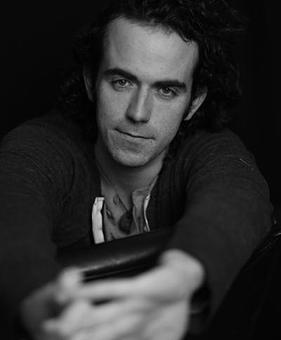
Dan Beaulieu:
Beaulieu credits his high-school guidance counselor with giving him the push to major in theatre at a time when he was feeling conflicted. “When you’re into theatre, especially at an early age, it feels so good it almost feels selfish. You can easily lose site of the fact that it affects other people and that the arts are critical for people to experience. She told me, ‘You have thousands of lives to touch. Do theatre,’” Beaulieu recalls.
Catch ShakesBEERience in action at The Press Room this winter
January 26 - Troilus & Cressida
February 23 – Hamlet
Just in time for the playoffs ...
Dan Beaulieu’s 10 Shakespearean Quotes Perfect for Shouting During a Football Game
Learn more:
Seven Stages Shakespeare Company
-
Written By:
Tracey Bentley | Communications and Public Affairs

















































